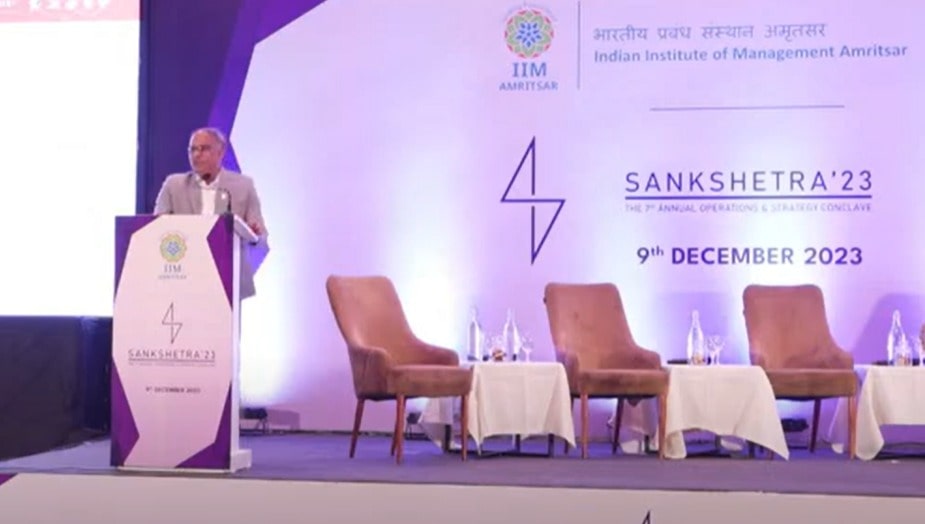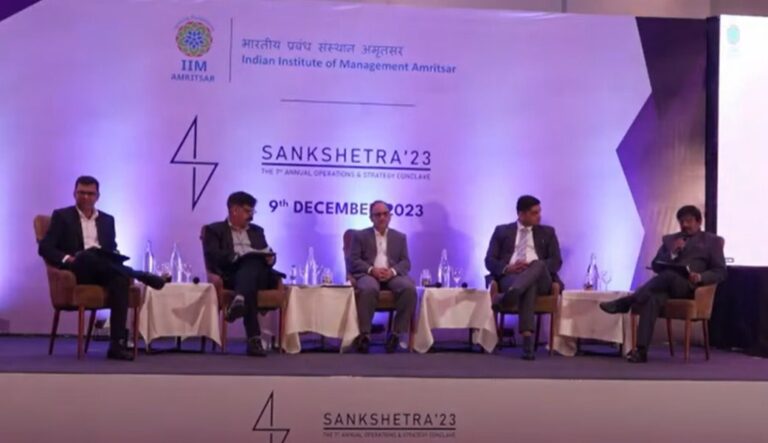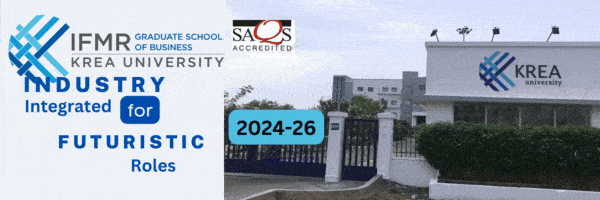IIM Amritsar concluded the 7th edition of its annual operations and strategy conclave, Sankshetra, on 9 December 2023. The event occurred at the Taj Swarna, Amritsar, and was live-streamed on IIM Amritsar’s YouTube channel for those who couldn’t participate. Just as white light is dissected into an array of colors, Sankshetra serves as a daisy for eminent industrialists to break down the intricacies of the operations and strategy domains.
The event was inaugurated with a lamp-lighting ceremony with Dr Divya Tripathi, Student Affairs Chair, Mr Ajay Singh, the operation panel’s keynote speaker, and the illustrious panelists for the session. The ceremony was followed by a speech by Dr Divya Tripathi, who addressed the gathering on behalf of IIM Amritsar’s director. She spoke of the growing concern about the depletion of natural resources and how the circular economy has gained prominence in response to these concerns. She also discussed the negative impacts of a linear economy and urged the students to take the time to listen and deliberate over the insights that would be shared by some of the finest minds in the industry during the panel discussion.
The theme for the operations panel was “Role of Supply Chain in Creating Circular Economy.” It explored the crucial role of the supply chain in creating a circular economy by influencing how products are designed, produced, consumed, and disposed of. The theme was introduced to the audience with a presentation by Mr Yatharth Shah and Ms Ananya Singh. They elucidated the various facets of the circular economy, its benefits, deterrents, and the supply chain’s significant role in its fruition.
The dais was then taken over by Mr Ajay Singh, Vice President of Supply Chain Management, Hindustan Platinum, who gave the keynote address. A distinguished supply chain transformational business leader with an impressive track record spanning over 30 years, Mr Ajay Singh, has exhibited prowess in developing, structuring, operating, and successfully delivering multi-functional tactical and strategic assignments, particularly in supply chain management. He emphasized the importance of appreciating the extent to which the world is interconnected. In today’s world, a war in Ukraine or Israel affects the entire supply chain and impacts consumption in India. As such, the supply chain plays a gigantic role in the broader goal of sustainability. We can achieve a circular economy through remedies to the supply chain and take a necessary step towards protecting Earth.
IIM Amritsar MBA Placement 2023. Average salary 16.51 LPA
Following Mr Singh, the moderator of the session, Dr Radha Mohan Gupta, Former SVP of Supply Chain, Devyani International Limited, introduced the topic of discussion. He explained how proactive planning for sustainability begins at the drawing board. For a sustainable future, the circular economy must become part of the very blueprint of the product design and not an afterthought. He also appreciated the Indian culture, how it promotes reusability and sustainability, and how we must carry forward such traditions to alleviate the burden of industry processes on sustainability.
IIM Amritsar MBA SIP 2024 Batch
IIM Amritsar Inaugurates MBA-09, MBA BA-03, MBA HR-03, PhD-04 Batches
Mr Shivendra Ojha, Director- Strategic Sourcing & Procurement, Cargill, pointed out that while boardroom discussions are shifting focus towards sustainable and resilient supply chain channels, consumers are still hesitant to adopt sustainable products due to their cost-prohibitive nature. He opined that just as many people are reluctant to wear a seatbelt for safety unless fines are imposed, most consumers would only convert to sustainable products once there are financial incentives.
Mr Bharat Bhushan, Head Distribution and Logistics, Mankind Pharma Ltd, furthered the conversation by discussing financial constraints. He maintained that while most consumers might be enticed by the idea of promoting sustainability and the circular economy, expressing that while the elite class may be willing to invest in the circular economy, the middle class, comprising the backbone of business consumers, often grapples with the economic constraints of such choices.
Mr Mandar Kulkarni, Head -Warehouse & Logistics, Sun Pharma, focused on the importance of product design and packaging aligned with customer expectations and raw material availability. He stressed a holistic view of the entire value chain, starting from design and suppliers and progressing through manufacturing, sales, and service.
Mr Ajay Sikka, Director- Global Supply Chain CoE, Carrier HVAC, emphasized technology’s role in influencing the supply chain and taking a step towards the circular economy. He stated that circular economy initiatives require quick wins like packaging improvements and investments in technology, government regulations, and a shift in business models. He emphasized creating an integrated approach across the value chain, from suppliers to customers, to drive sustainable practices in the long run.
The operations session ended with an apt summary of all discussed by the panelists, Mr Navneet Venkateshwar, a student at IIM Amritsar.
Then, after a short lunch break, the strategy session began on the theme “Navigating Economic Downturns: Industry Challenges and Strategies.” It was introduced to the audience by Ms Evika Jain and Ms Real Dabi, who discussed the numerous economic downturns, such as the great depression and the COVID-19 pandemic, critical indicators of economic downturns, and the financial, marketing, and technological strategies to navigate them.
The keynote speaker for the session, Mr Himanshu Saxena, Chief Operating Officer and Managing Director, BBH India, shared fascinating insights on economic downturns. He spoke of three crucial things to consider. Firstly, businesses should focus on the effects and causes of economic downturns. He expressed that we tend to only focus on the former and not give enough significance to the latter. Second, They should notice the tell-tale signs of impending downturns and plan accordingly. And finally, they should aim for long-term resilience.

Following the keynote speech, the moderator for the strategy session, Mr Muthar Basha, Chief Operating Officer, Indo National Limited, kicked off the panel discussion by accentuating the importance of agility in dealing with calamities like how companies quickly adopted e-commerce, online meetings, and work from home during COVID-19.
Mr Amit Kekre, Chief Strategy Officer, TBWA India, highlighted the importance of collaboration and a sense of humanity during times of crisis. It leads you to seek new opportunities and partnerships. Hence, contrary to what you’d think, a business should double down on building a brand during a crisis. In tough times, a strong brand is more than just a name; it’s a reliable companion. Doubling down on relevance and presence during economic downturns isn’t just a strategy – it’s a practical way for businesses to connect with customers and weather the storm together.
Mr Anshuman Shrivastava, Chief Commercial, Exide Industries Limited, talked about how economic downturns and unexpected crises, in general, inspire and accelerate innovation. The pandemic led businesses to explore new opportunities, adopt new strategies, and embrace technology.
Mr Harish Wadhwani, General Manager Process and Control, Varuna Group, contemplated various strategies to tackle economic downturns. He expressed the significance of modularity in businesses to separate non-performing elements at any time for sustained adaptability. He also spoke about perpetual brand evolution, technology, and sustainable resilience.
Mr Amit Dwivedi, Chief Strategy Officer, TBWA India, made an interesting point about how crisis resilience must be culturally ingrained. A robust and supportive culture ensures stability and people-oriented strategies lead to successful navigation through crises.
The conclave was concluded by Mr Shyamansh Agarwal, a student of IIM Amritsar who summarized the panel discussions, and a Q&A session where the students of IIM Amritsar eagerly proved their enthusiasm to participate.
About IIM Amritsar: Indian Institute of Management (IIM) Amritsar is an institution of National Importance established by the Ministry of Human Resource Development, Government of India in 2015. It is the 15th IIM set up by the Ministry of Human Resources Development with the support of the Government of Punjab.
IIM Amritsar offers a two-year general Master of Business Administration (MBA) program and a specialized MBA in HR and Business Analytics. The institute also provides a two-year Executive MBA (EMBA) and various customized short and long-duration Management Development Programs. These programs have been designed to provide world-class management education to meet the requirements of organizations across sectors for management professionals. The institute is committed to imparting solid educational foundations and values in the thoughts and actions of future managers.





